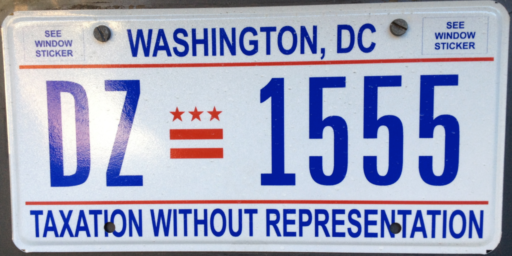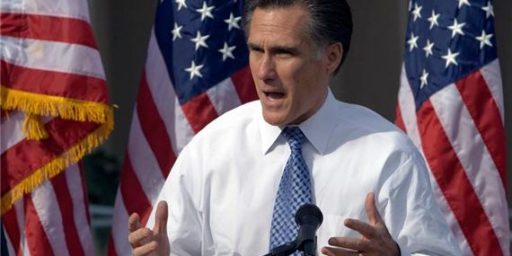D.C. Retrocession Redux
Cato’s William Niskanen argues in today’s Washington Examiner, as I have numerous times in this space, that the solution to the lack of congressional representation for D.C. residents is not an unconstitutional single vote in the House but rather retrocession to Maryland.
Mayor Adrian Fenty might not like it, but retrocession would be superior for most District residents on political, fiscal and economic grounds. Politically, District voters would get full representation in the House of Representatives, plus the opportunity to vote for the two senators from Maryland, the several senior state officials and the local legislators.
[…]
The most likely new residents of Washington, Md., would be those who are now most deterred by the District’s high taxes and poor government services: wealthier individuals and families, those with school-age children, those who expect to leave estates and businesses — especially unincorporated businesses, restaurants and hotels.
[…]
Retrocession would also lead to a division of government roles between the District and the state of Maryland. A division of roles similar to that now in Maryland would leave the new city of Washington, Md., with control of K-12 education, police, fire, corrections and streets; and most expenditures for parks and recreation, housing and waste disposal.
The Washington government would no longer bear the rapidly increasing costs of Medicaid, the responsibility for administering the University of the District of Columbia, and the special problems of providing long-term incarceration. Maryland would assume the responsibility for providing higher education, public welfare, health and hospitals, highways and prisons.
Aside from the not-insignificant problem that neither the citizens of Maryland nor the residents of the District support this idea, it makes plenty of sense. And, again, it has the additional advantage of being constitutionally permissible.
My only caveat is that I would not retrocede the entirety of the District but only residential D.C. I would still keep the government district, including the White House, Capitol Hill, the Supreme Court, and the National Mall as a separate District under the current constitutional scheme. The Framers showed wisdom in having the seat of government separate from the influence of any single state. They did not, however, anticipate half a million people moving there and being disenfranchised.




When Texas was moving from totally dry to mostly wet state, usually the vote was done by county. In Dallas, they broke it down further and made the wet/dry choice precinct. While I would suspect that Maryland would be just as happy to not gain the denizens of DC, I think it would be interesting to do a precinct by precinct non-binding referendum to see where the citizens stand. In the interest of fully informed decisions, they should also be informed on what changes in taxes would come with the move.
As to the plight of DC residents not being able to vote for Congress critters, the question I would ask is if we can secure the border of DC so effectively to prevent these people from moving where they can breathe the free air of congressional elections, why can’t we secure our national borders. It would seem to me that the denizens of DC have voted with their metaphorical feet to value something else higher than the right to vote in congressional elections.
I’m not sure one could draw any sort of line to separate ‘federal DC’ from ‘residential DC’. While agency and department headquarters might be located in a segregatable area, there are many branch offices (State alone has at least 44 annexes) scattered around the area, including in nominally residential/business areas.
Part of this could be solved, of course, by moving most of the federal HQs out of DC and putting them around the country. I think this would be beneficial on many counts.
And I’ll still beat my drum about DC votes: Forget it. Instead focus on getting rid of federal taxes on those prohibited from full representation by the fact of their residency!
The district was originally created because no state was willing to allow any other state to be the permanent capital of the new country.
But we have grown up now and I think we can be persuaded to overcome the jealousy that justified the district in the first place.
That said, the question is which state gets to host our nations capital? There is no requirement that a state be contiguous so we have fifty states in contention to annex the district and host the capital city.
The best solution is to sidestep the controversy and make Washington DC a separate state, the fifty first. It could be called Columbia State, or Captital State or something else.
This solves the problem for all the existing states as no one gains an advantage over any other and it gives the residents their rights to fully participate in our nations political process. A win win for all involved.
I guess I’m just John’s little shadow today. He’s precisely correct: the offices should be spread around the country more. That experience suggests that they would be moved to the home state/district of prominent senators and representatives should be no deterrent. Welcome to West Virginia, y’all.
And removing federal taxation within the District would simultaneously defuse the taxation without representation trope and introduce incentives for businesses to open up in the District, providing jobs and economic growth.
The problem with that, aside from the partisan political considerations, is that D.C. is tiny and getting smaller in terms of population. It would be simply ridiculous to create a new state with 581,530 residents and give it two Senators and a Representative.
Yes, Wyoming has slightly fewer people. But we added it to the union in 1890 under radically different circumstances. And Wyoming is at least a state-sized entity, ranking 10th among states whereas D.C. is a mere 68.25 square miles. Rhode Island, currently the smallest, is 1,545 square miles.
Also another problem with making DC the 51st state is that it has not natural recourses and very little industry or ability to produce outside of government offices-and I am not too keen on having the only way to gain state income for a state being money from the Federal government-which is in reality the US taxpayer in the other 50 states.
I actually think it makes sense for either the District in its entirety to go back to the states that originally donated the land for the capital, or for Maryland to annex the main residential portions into the state.
I like the idea of the Capital building, the SCOTUS, White House and mall-bassically that immediate area remaining a District-without annexation, but at this point-I am not so sure that is all that important they remain seperate and distinct from state government.
I also very much like the idea proposed by John that many of the government offices be dispersed among the 50 states. With communications being what they are now, it seems to me it might be a good idea to have some of the offices set up in other cities and states.
A fair point, although we could get what most think of as “DC proper” lined off pretty easily. Presumably, the various government annexes could either be consolidated elsewhere or simply treated as federal enclaves a’la military reservations.
Agreed, too, on the advantages of moving much of the day-to-day ops out of DC. Not only would it be cheaper, ease commuting times, and so forth but it would have the advantage of being an excellent security measure. Having all one’s eggs within one basket is just poor counterterrorism practice.
There is no reason to disperse the office across the various states and if we are not going to create another state then the question remains as to which state is going to be allowed to annex the district and host the nations capital city.
The districts resident would be best off if they were annexed by a New York or California sized state than by tiny Maryland. They would gain the advantage of being represented by the largest delegations in congress and this would almost guarantee tons of federal money being spent there for various infrastructure improvements.
But as a practical matter this will not happen any more than will Maryland be allowed to annex the district. Annexation is a dead issue. It will never happen. No, the only solution that is fair and politically viable is to create a new state.
Beside growing the nation by adding a new state would appeal to our national pride and be more consistent with our values.
No, the only solution that is fair and politically viable is to create a new state.
And just what with this new state do to generate income for the state?
I don’t see any advantage at all to the US to admit the district as the 51st state.
At least Montana and Rhode Island have something other than the government as a natural recourse and industry to produce income for the state.
Also, not so sure having one teeny tiny state that’s main source of income is the presence of the government having that kind of influence.
I figure if the residents of DC don’t like the situation, then annexation is the best option. I am not sure why DC needs the residential area anyway as part of the district.
While all federal agencies have, of course, a nationwide mandate, they do not need to have their entire headquarters staffed in one place.
Would a Dept. of Agriculture be more or less properly placed in a state that derives the bulk of its economy from agriculture? Why not put the Dept. of Labor in St. Louis or Denver? HHE could work as well out of Rhode Island as Oklahoma.
Sure, each would need a headquarters building in DC, but that could be staffed by the executive floor of each of the agencies and departments, not their entire domains.
Even departments–like State–that have no job-specific constituency, have important satellite offices around the country, from payroll, handled out of SC, to passport offices here and there.
One of WV Byrd’s power grabs was to move one of CIA’s functions to offices in Wheeling. CIA headquarters said, ‘It’ll never work. Our people will refuse to go.’ Turns out that they had to turn down applications to relocate because so many were more than willing to accept lower locality pay for safer cities, better schools, and a lower cost of living.
John you make good points. I imagine a lot of the lower level folks in some of those agencies would happily move to cheaper areas that don’t involve a commute in or around the beltway.
Also, while 50 or 100 years ago having the majority of an agencies offices centrally located was probably more of a neccessity-now with the internet, phone systems (cell, landline and satellite), and the ability to visually teleconference-you can’t really convince me that all aspects of an agency have to be housed in one building and all within an easy commute to the capitol.
I think it would be to the long term benefit of these agencies if they were to develop local constituencies beyond lobbyists. Maybe it would only be shifting the lobbyist chairs, but have a federal agency part of your neighborhood gives you more reason to understand how and why it exists in the first place.
Some agencies that lace a specific geographic basis for focus–State, Defense, CIA, FBI, DHS–could stay in DC if necessary. Others could keep a cadre of <1,000 to support the Cabinet officer who arguably needs to be near the White House and Congress.
Couple a decentralization of the federal government with a waiver of federal taxes for DC residents and you'd have a city there'd be lines forming to apply for residency. Oh, and probably a lot of newly defined 'illegal aliens'.
Retrocession of portions of DC seems an elegant solution, but not a likely one and making DC a federal tax haven is problematic at best.
I don’t think that DC should be a state largely for the reasons that it was not placed within a state originally. There have, however been a few very weak arguments against this proposal that I take issue with.
First if you consider Wyoming to have slightly fewer residents than DC, then DC has only slightly fewer residents than Vermont, Alaska and North Dakota yet they continue to enjoy disproportionate representation. Second DC receives over 21 million tourists a year, this is a significant source of income. Yes DC would have almost exclusively a tourist and government economy, but that is also true of Hawaii at least.
The Framers came up with the compromise that created the Senate because they entered into the Convention as 13 sovereign entities. Further, the entire national population was something like 4 million. Vermont was one of the original 13.
Wyoming and ND were part of the Northwest Territory. Knowing what we know now, we’d not have admitted all those states individually. Alaska is a rather special case because it’s non-contiguous. It doesn’t make sense to compound old errors with new ones, though.
I remember my grammar school civics. I seem to remember that amendments to the constitution change what is or is not constitutional, which is why so many roadblocks lie in the way.
What DC wants is a constitutional amendment to grant one congressional vote and the one delegate in the electoral college that would grant. Why is it taken as a serious argument against it that it is not currently constitutional? Shouldn’t a real argument be put forward as to why it shouldn’t be constitutional if one opposes it? If there is a good one, I haven’t seen it. On the other hand the argument for enfranchising the citizens of DC for the sake of their not being disenfranchised is compelling.